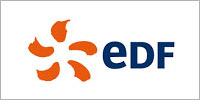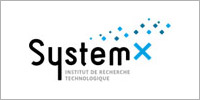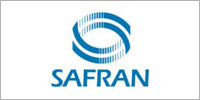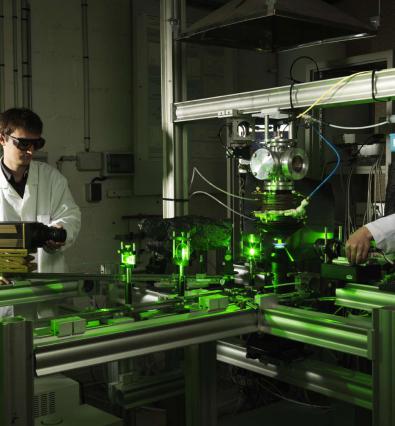The CentraleSupélec Research Centre aims to bring innovative solutions to the major challenges of society, through the advancement of knowledge. Its close relationship to the business community lends itself more easily to the forging of solid and varied partnerships, with emphasis on industry relations.
Collaborations between CentraleSupélec's research and businesses take different forms. We provide industrialists access to researchers of the highest academic and scientific level. The expenses related to these collaborations are eligible for the Research Tax Credit.
Doctoral thesis
The research collaboration between a business or industrial organisation and CentraleSupélec can be carried out within the framework of a doctoral thesis of 3 years: The doctoral candidate can either be an employee of the company (CIFRE, an industrial convention for training through research, or a funded doctoral candidate of the school.
Scientific advice, study, expertise
The CentraleSupélec Research Center also offers:
- outsourced research contracts, with a duration varying from several days to several months
- assistance and advice with defining a scientific program
- the benefits of scientific equipment of the highest order
Collaborative projects
The school’s laboratories also participate in collaborative research projects supported by external public funding aimed at joint academic/industry consortia, such as projects for the Agence Nationale de la Recherche and the European Union.
Framework agreements
For up to 4 years - the framework agreement is based on a defined scientific program and specifies the collaboration and the respective contributions of each partner. A steering committee ensures compliance with the initial guidelines and evaluates the progress of the work.
Mixed teams
The Research Center has also set up joint teams with the industrial community.
For example:
RISEGrid: A research institute dedicated to intelligent electricity distribution networks in partnership with EDF. Established in 2012 by EDF and CentraleSupélec, RISEGRID (Research Institute for Smarter Electric Grids), a research institute whose objective is to prepare and support the development of intelligent electrical distribution networks known as Smarts Grids. This modernization of the network will contribute to the energy transition by enabling electricity to be supplied even more efficiently.
Chairs: long-term partnerships for mutual benefit
In addition to a growing number of research contracts with a large network of partner companies, CentraleSupélec has developed chairs of companies and collaborations with the industrial world of 5 to 10 years for the advancement of knowledge on future research agendas.
CentraleSupélec now has 15 university-corporate partnerships
Supply Chain Management with Carrefour, LVMH, Safran, Sanofi
 |
 |
 |
 |
-
Lab: LGI
-
Lead researcher: Yves Dallery
Three lines of research have been identified by the partners in the Supply Chain Management partnership, which is committed to continuing the work that has been conducted since its creation in 2008.
- Flexibility management
The current industrial world is characterized by an increasing level of uncertainty with increasingly personalized customer expectations and markets changing at a faster rate. In order to address these uncertainties, we must firstly reduce their size, using methods and performance forecast processes, as well as developing flexibility to address any remaining uncertainties.
-
Environmental impact of the supply chain and sustainable development
Sustainable development has become a major concern for public authorities and consumers.
Every business needs to pay close attention to sustainable development, not only for regulatory reasons but also for its own development. -
Performance measurement and management
This topic focuses on the performance measurement and management systems of the supply chain in industrial or distribution companies.
It covers two interrelated sub-topics:- The issue of performance measurement: specification of the performance indicator system to effectively and comprehensively evaluate various activities and processes in the supply chain,
- The issue of performance management: specification of the performance management process, the stakeholders involved and their respective roles. This enables the use of indicator systems in place to manage activities and processes in the supply chain, so as to determine their performance level and identify areas for improvement in these performances and related issues
Systems Science and Energy Challenge with the EDF Foundation

- Lab : LGI
- Lead researcher : Enrico ZIO
EDF, Europe's energy leader of tomorrow, provides essential goods and services in France and many other countries. In this regard, the company is situated at the very center of major energy and environmental challenges that the world will face in the coming decades.
The objectives of the Challenge are broken down by activity:
- Safety and resilience of complex systems for energy generation, transmission and distribution
- Operational safety, resilience and optimization of components and systems for energy generation, transmission and distribution
The activities of the Challenge in these fields are focused on the development, implementation and use of models, numerical methods and algorithms, including:
- Modeling of failure modes and degradation
- Simulation
- Forecasting
- Optimization
- Risk, vulnerability, resilience analysis
Centre d’Excellence «Biotechnologies blanches» “White Biotechnology” Center of Excellence] (CEBB) with the City of Reims, the Department of Marne, the Champagne-Ardenne Regional Council
 |
- Lab : LGPM
- Lead researcher : Patrick PERRE
Oxy-Combustion Research Institute
- Lab : EM2C
- Lead researcher : Thierry SCHULLER
- Partenaires :
- Institution : ANR
Partners of the Air Liquide Oxy-Combustion Research Institute develop research activities in the field of combustion optimization and heat transfers. The research program aims to increase knowledge related to high-pressure oxy-combustion in different types of combustibles, for which gases are diluted by carbon dioxide or steam, using an experimental platform with significant optical access. It brings together researchers specializing in oxy-combustion experimentation and diagnostics, heat transfer, particularly, by radiation, and simulation of interactions between combustion, turbulence and heat transfers.
Chaire Armand Peugeot [Armand Peugeot Institute]: Hybrid Technologies and the Economy of Electromobility with PSA and ESSEC Business School

-
Research Institute
-
Topic: Hybrid Technologies and the Economy of Electromobility
-
Labs: LGI, GeePs
-
Lead researchers: Danièle Attias, Marc Petit, Jan Lepoutre
The hypotheses for mobility development over the next 20 years, and the place of hybrid vehicles in the market are often contradictory. Regardless of any uncertainties, the most accepted assertion is that development in electromobility will lead to a complete change in supply and demand. Therefore, the objective of Chaire Armand Peugeot is to create a space for discussion, training and prospective research in order to construct scenarios for technological, economic and marketing developments:
-
Because the automobile sector is a rapidly evolving sector,
-
Because innovations are made through networking and partnerships
-
Because today's youth will be tomorrow's customers
Chaire Armand Peugeot produces exploratory research, using a cross-section of skills from engineers, economists and managers, in a business-schools partnership. The partnership between PSA, CentraleSupélec and ESSEC Business School covers varied and complementary multidisciplinary fields. These are required to address the complexity of questions posed by the future of the automotive industry in a context of electromobility development. Its structure therefore allows engineering sciences, economics, management science and social sciences to be brought together on one project.
Chaire BlériotFabre [Blériot Fabre Institute]: Robustness, Control and Modeling of Aircraft Embedded Systems, Complex Systems with Safran
- Lab : LGI
- Lead researcher : Antoine RAUZY
Chaire Safran Blériot-Fabre responds to partners looking to strengthen their expertise in Systems Sciences, and bring breakthrough innovations into the design, simulation, architecture and development of complex systems, especially in the field of embedded systems. Indeed, the systems developed by Safran (navigation systems, engine control, energy management, passenger flow safety etc.) are becoming more complex, with an increasing number of functions to integrate, requirements to respect and performances to achieve.
The institute’s framework is multidisciplinary integrative innovation combining:
- functional and dysfunctional modeling of architectures, and those of physical subsystems (multi-business, multi-physics, multi-scale) in relation to the system architecture,
- advanced simulation (high performance, real time),
- automation and control, and
- statistical and reliability approaches for system robustness and monitoring.
The work of the institute aims to develop concepts, methods and tools for the integration of different engineering disciplines (mechanical, automation, IT, etc.), so as to validate and verify system properties, thereby meeting the needs of their users.
Purchase Risks in Complex Projects with Total
- Lab : LGI
- Lead researcher : Franck MARLE
Total wanted to strengthen its commitments in the scientific field of Industrial Projects Purchasing, and join in the creation of the CentraleSupélec Complex Industrial Projects Purchasing Risks research partnership.
A complex industrial project, from exploration to production, which requires implementing an efficient supply chain for purchasing (contracts for goods, services, studies, data etc.). The requirements, consultations, decision making, control (skills, processes, technical performance, finance, quality etc.) must be coordinated with the engineering processes (design, implementation, testing, etc.) In addition, supplies are rarely in line with business needs (technical, financial, time constraints etc.). How can research and education in process control for the requirements in a complex project environment help to achieve sustainable competitiveness?
The partnership’s lines of research include:
- Measuring the cost/quality/time ratios and the creation of value associated with projects
- Measuring the performance of the supply chain
- Developing tools for decision-making on purchasing strategy options
- Analyzing and measuring project risks and their management
- Modeling the performance of previous projects for better anticipation
Mechatronics with Faurecia and ESIGELEC
 |
 |
- Lab : GEEPS
- Lead researcher : Laurent DANIEL
The design of embedded systems, such as those developed by Faurecia for automobiles, uses specific methods, taking into account multi-physical, multi-technological and multi-scale aspects.
The Faurecia Mechatronics partnership aims to define methods and validate them in use, such as the issue of electromagnetic and thermal compatibility, design and modeling of smart actuators, and the optimization of their interfaces, or effectiveness regarding consumption and re-use of electrical power for automobile seating, emission controls, driver seats, automotive exteriors and smart vehicles. It should be possible to build methodological developments that take into account the complexity of these systems, while ensuring their operational robustness in relation to sources of uncertainty or partial knowledge of their final operating mode, beginning at the design phase.
The partnership’s lines of research include embedded electronic systems for automobiles, smart seat design, optimizing emission systems:
- Development of design techniques that take into account this complexity
- System behavior optimization (made possible by intensive simulations)
- Consideration of security and dependability, beginning at the design phase
Complex-System Engineering, Innovation and Digital Manufacturing with Dassault Aviation

- Lab : LGI / Département des Sciences de l’Entreprise
- Lead researcher : Pascal MORENTON
CentraleSupélec and its Business Sciences Department have developed teaching activities in the field of Complex-System Engineering. These activities are reflected in particular through teaching in the engineering school, research master’s programs and doctoral school. Dassault Aviation wanted to support the design and implementation of teaching in this field, bringing its expertise to education and providing guidance for students. The partnership covers Complex-System Engineering, Innovation and Digital Manufacturing. The topics are handled by referencing and contextualizing phases in the life cycle of the product or system, namely, specification, design, industrialization, in an integrated-engineering approach.
Chaire Anthropolis [Anthropolis Institute] with the SystemX Technology Research Institute, Alstom, ENGIE, RATP, Renault and SNCF
 |
 |
 |
 |
 |
 |
- Topic : Design of Use-Oriented Urban Systems
- Lab : LGI
- Lead researcher : Jakob PUCHINGER
The work of the Chaire Anthopolis focuses on eco-innovations for sustainable urban and suburban development serving citizens and communities, with the inclusion of interactions between systems. The institute aims to put people at the center of the systems and services design for the city and its suburbs (a design focused on people and uses). The institute is more specifically centered on the question of application for interactions between mobility systems (individuals and goods), and other systems (commercial, energy, information, urbanization and construction, etc.), using specific objectives for each user and public authority.
These systems and their interactions reflect many developments, such as new emerging mobility technologies (electric cars, electric and gas buses, etc.), new energies for cities, small towns (organic PV, solar thermal, biogas, etc.), smart grids and energy storage technologies, building use development (residences, railway stations, parking lots, private vehicles, etc.), and more generally everything involved in the changing the sociology of citizens (including senior citizens) and eco-innovations.
Indeed, innovation is increasingly more commonly created from individual initiatives or spontaneous groups. Therefore it should be cultivated with a better understanding of current developments in an increasingly digital society, operating in networks where socio-technical interaction has become a necessity. There is an ongoing shift from addressing individual needs (the user) to systems of systems to meet user needs while integrating concepts (systems, services, uses, etc.), with the management of different interacting urban flows.
This will identify the basic methods and tools to address the needs of the citizen-user, city and community, in systems and services design processes. Experimentation is a major component of the institute’s research work.
Datascience with Givaudan
In flavours and fragrances domains, massive data are complex and are pushing technical limits in many areas, specifically in decision-making and optimization. The objective of this collaborative work between Givaudan and CentraleSupélec is to face the challenges “Data-to-Knowledge” and “Data-to-Decision” in an integrated way through cutting edge research. More precisely, one aims at developing breakthrough techniques for dealing with high-dimensional and multi-scale data. Givaudan has and creates, in its activities domain, massive data of different natures.
It is essential to exploit these data to improve the understanding or to provide innovative and challenging techniques in the perfumery. Mainstream statistical models and decision-making algorithms are challenged by such heterogeneous, multi-scale, complex, incomplete and/or uncertain data. In order to generate knowledge, build models and make informed decisions, statistical validity, robustness, computational tractability and causal modelling are mandatory. This is the scientific purpose of this Chair: developing advanced Machine Learning techniques adapted to such data.







